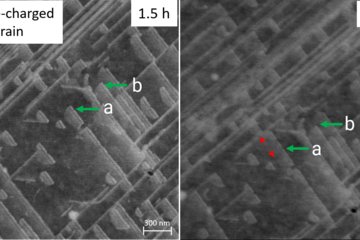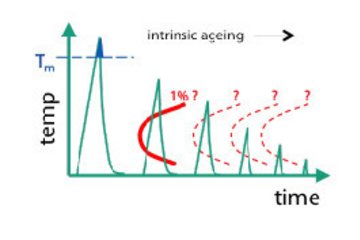All genres
21.
Talk
Impact of Magnetism on the Stability of Topologically Close-packed (TCP) Phases in Fe–Nb Alloys. Intermetallics 2017, Educational Center Kloster Banz, Bad Staffelstein, Germany (2017)
22.
Talk
Adaptive behavior in the Fe–C system. Pearlite workshop, MPIE, Düsseldorf, Germany (2014)
23.
Talk
Ab initio study on the role of interfaces for structural transformations in the Fe–C system. TMS 2014, San Diego, CA, USA (2014)
24.
Talk
Ab initio based insights into structural transformations and the role of interfaces in Fe–C alloys. DPG 2014, Dresden, Germany (2014)
25.
Talk
Atomistic origin of structural modulations in Fe ultrathin film and impact for structural transformations in Fe–C alloys. ADIS Workshop 2014, Ringberg, Germany (2014)
26.
Talk
Adaptive behavior in the Fe–C system. ICAMS Advanced Discussion, Bochum, Germany (2013)
27.
Poster
Impact of magnetism on the stability of Laves phases in Fe–Nb alloys. DPG-Frühjahrstagung 2017, Dresden, Germany (2017)
28.
Thesis - PhD
Development of an ab initio computational potentiostat and its application to the study of Mg corrosion. Dissertation, Ruhr Universität Bochum (2020)
29.
Thesis - PhD
Ab initio study of strongly anharmonic and dynamically unstable systems. Dissertation, Ruhr-Universität Bochum (2019)
30.
Thesis - PhD
On chemically sensitive atomic scale imaging. Dissertation, Ruhr-Universität Bochum, Bochum, Germany (2018)
31.
Thesis - PhD
An ab initio study of muscovite mica and formation energy of ions in liquid water. Dissertation, Fakultät für Maschinenbau der Ruhr-Universität Bochum, Bochum, Germany (2016)
32.
Thesis - PhD
Ab Initio Study of the Low-Index Non-Polar Zinc Oxide Surfaces in Contact with Water: from Single Molecules to Multilayers. Dissertation, Fakultät für Physik und Astronomie der Ruhr-Universität Bochum, Bochum, Germany (2015)
33.
Thesis - Master
Ab initio investigations on the energetics and kinetics of defects in Fe–Al alloys. Master, Ruhr-Universität Bochum, Bochum, Germany (2014)











